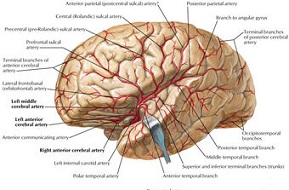BREAKING! Egyptian, Swiss And Canadian Scientists Discover That SARS-CoV-2 Uses Host Cathepsins To Bind And Gain Entry Into The Brain And Its Vasculature
Source: Brain-SARS-CoV-2 Oct 13, 2020 5 years, 4 months, 1 week, 6 days, 7 hours, 28 minutes ago
Brain-SARS-CoV-2: Swiss, Canadian and Egyptian researchers from the Institute for Regenerative Medicine-Neuroscience Center-Zurich, Division of Neurosurgery, University and University Hospital Zurich, Krembil Brain Institute and Krembil Research Institute-Toronto, Toronto Western Hospital and University of Toronto have in a new study discovered that the
SARS-CoV-2 coronavirus uses brain and brain vasculature cathepsin proteases B (CTSB) and -L (CTSL) as substitutes for the ACE2 co-receptor TMPRSS2 in order to gain entry into the brain and its peripheral vasculature.

These findings were confirmed at the protein level in the Human Protein Atlas and using immunofluorescence stainings. This expression pattern of SARS-CoV-2 viral entry associated proteases and these SARS-CoV-2 interaction partners were also present in endothelial cells and microglia in the fetal brain, suggesting a developmentally established SARS-CoV-2 entry machinery in the human vasculature.
This new finding provides an explanation as to how the COVID-19 disease is also manifesting a wide array of neurological conditions in infected COVID-19 patients and also warns about the long term health implications of recovered patients and also raises tons of questions such as can current diagnostics used to evaluate COVID-19 recovery detect SARS-CoV-2 coronavirus in the brain?
The study finds are published on a preprint server but are currently being peer-reviewed.
https://www.biorxiv.org/content/10.1101/2020.10.10.334664v1
To date numerous COVID-19 patients manifest neurological symptoms such as stroke and encephalitis, among others. This has baffled clinicians on how the SARS-CoV-2 coronavirus affects the brain, particularly the peripheral vasculature.
This new study sheds light on the mechanism behind brain involvement in the COVID-19 pandemic. The Swiss and Canadian study team aimed to understand further the potential mechanisms underlying SARS-CoV-2 tropism for brain vasculature to see how infection occurs in the brain.
The study team wanted to determine the cause of why COVID-19 patients experience neurological symptoms, including strokes and encephalitis, a potentially deadly inflammation of the brain.
A recent study has also shown that a third of hospitalized patients affected by COVID-19 exhibited acute cerebrovascular events, including ischemic and hemorrhagic strokes, impaired consciousness, and muscle injury, which were even more common in patients with severe illness. https://jamanetwork.com/journals/jamaneurology/fullarticle/2764549
Interestingly this new study involved constructing a molecular atlas of the expression patterns of the SARS-CoV-2 viral entry-associated genes, including receptors and proteases, and SARS-CoV-2 interaction partners in human and mice brains.
In order to arrive at the study findings, the study team examined the expression patterns of the SARS-CoV-2 virus on the brain.
The study team found that a distinct expression pattern of the cat
hepsins B (CTSB) and -L (CTSL), which can substitute for the angiotensin-converting enzyme 2 (ACE2) receptor TMPRSS2, in the human vasculature. They also found that the CTSB is mainly expressed in the brain blood vessels, and CTSL is seen predominantly in the peripheral blood vessels.
In order to confirm the findings, the study team examined the mechanism in the protein level in the Human Protein Atlas and through the use of immunofluorescence staining.
In addition, the study team confirmed that the same findings were seen in the fetal brain, suggesting a developmentally established SARS-CoV-2 entry machinery in the human blood vessels or vasculature.
Corresponding researcher, Professor Dr Thomas Wälchli from the Krembil Brain Institute and Krembil Research Institute-Toronto who also hold a position at the Division of Neurosurgery, University and University Hospital Zurich told Thailand Medical News, “At both the adult and fetal stages, we detected a distinct pattern of SARS-CoV-2 entry associated genes' transcripts in brain vascular endothelial cells and microglia, providing a potential explanation for an inflammatory response in the brain endothelium upon SARS-CoV-2 infection.”
It was also found that CTSB was expressed in adult and fetal brain endothelial cells, with genes and pathways involved in innate immunity and inflammation, blood-brain-barrier permeability, angiogenesis, coagulation, and vascular metabolism.
These study findings highlight the role of brain endothelial cells in developing neurological symptoms in some COVID-19 patients.
Professor Wälchli added, "Our research serves as a publicly available single-cell atlas of SARS-CoV-2 related entry factors and interaction partners in human and mouse brain endothelial- and perivascular cells, which can be employed for future studies in clinical samples of COVID-19 patients.”
Importantly the involvement of the brain in the disease process of COVID-19 has been seen in some patients who have already recovered from the infection.
Many COVID-19 patients have described neurological symptoms amidst their battle against the coronavirus infection.
One such patient described that after recovering from COVID-19, she experienced confusion and memory loss, even forgetting her car in the parking lot. Another patient recalled losing all memory of his 12-day vacation in Paris, even though the travel was just a few weeks prior. A nurse also experienced forgetfulness after recovering from the infection. The nurse forgets routine treatments and tests, even terminologies that were always used in the past.
Similarly many patients who went ill with COVID-19 experience brain fog, which included troubling cognitive symptoms that include confusion, memory loss, dizziness, problems in concentration, and trouble remembering everyday words.
Taken together, the study findings may have important implications for understanding SARS-CoV2 cellular entry and viral transmissibility in the brain, the brain vasculature, and in peripheral vascular beds.
Targeting cathepsins CTSB (and CTSL) using already approved drugs/known inhibitors (for instance E-64d, ammonium chloride) could result in inhibiting angiogenesis, vascular metabolism, vascular leakage, and the inflammatory response, resulting in vascular normalization.
https://pubmed.ncbi.nlm.nih.gov/32142651/
https://pubmed.ncbi.nlm.nih.gov/32439870/
As CTSB is expressed in the brain endothelium, and as SARS-CoV-2 invades the brain (putatively via CTSB) and might affect blood-brain-barrier integrity, the study discoveries might have important translational implications for both neurovascular and vascular symptoms observed in COVID-19 patients.
https://pubs.acs.org/doi/10.1021/acschemneuro.0c00122
https://jamanetwork.com/journals/jamaneurology/fullarticle/2766766
For more on
Brain-SARS-CoV-2, keep on logging to Thailand Medical News
